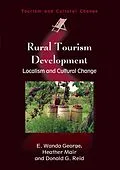Rural tourism represents a merging of perhaps two of the most influential yet contradictory features of modern life. Not only are the forces of economic, social, cultural, environmental and political change working to redefine rural spaces the world over, but broad global transformations in consumption and transportation patterns are reshaping leisure behaviour and travel. For those concerned with both the nature of change in rural areas and tourism development, the dynamics and impacts of integrating these two dramatic shifts are not well known but yet are becoming increasingly provocative discourses for study. This book links changes at the local, rural community level to broader, more structural considerations of globalization and allows for a deeper, more theoretically sophisticated consideration of the various forces and features of rural tourism development. While Canadian in content, the cases and discussions presented in this book can be considered generally relevant to any rural region, continentally and globally, that has undertaken or is considering rural tourism development.
Autorentext
Dr. E. Wanda George is an Associate Professor in the Department of Business Administration and Tourism and Hospitality Management, Mount Saint Vincent University, Canada. Dr. Georges research focuses on the interrelationships and dynamics that occur amongst tourism, rural communities, local culture and community sustainability. She has authored several publications about her research work on community tourism planning and development, with a particular focus on the role of culture in tourism development and community sustainability in rural Canada.
Dr. Heather Mair is an Assistant Professor in the Recreation and Leisure Studies Department, University of Waterloo, Canada. Dr. Mairs research focuses on the challenges and opportunities presented by tourism development in rural Canada. She has authored numerous publications in tourism and leisure studies with a particular focus on community-based tourism planning and development, leisure and volunteer activists, the (social) role of curling clubs in rural Canadian life and the need for enhanced critical and theoretical approaches to leisure and tourism research.
Dr. Donald G. Reid is Professor in the School of Environmental Design and Rural Development, University of Guelph, Canada. Dr. Reids research focuses on community development and social planning, tourism and recreation planning. Of particular interest is the marginalized in society and the integration of those experiencing poverty into mainstream society and issues of citizenship generally. His research work is centered in Africa and Canada. He has authored numerous publications that focus on community development, tourism, leisure and the marginalized in society.
Inhalt
Chapter 1 Introduction to Rural Tourism Development
Chapter 2 Political Economy of Rural Tourism Development in Canada
Chapter 3 The Case of Lunenburg, Nova Scotia
Chapter 4 The Case of Port Stanley, Ontario
Chapter 5 The Case of Vulcan, Alberta
Chapter 6 The Case of Canso, Nova Scotia
Chapter 7 Synopsis - From Case Studies to Premises
Chapter 8 The Complex Role of Culture in Rural Tourism
Chapter 9 Changing the Rural Landscape
Chapter 10 Notions of Community
Chapter 11 Sustainability and Rural Community and Sustainable Rural Tourism
Chapter 12 The Role of Public Policy
Chapter 13 Presenting a Process for Planning that Engages Community
Chapter 14 The Way Forward: Re-thinking Rural Tourism Research and Practice
